Common Procedures
Topics on this page

Regular Exams and Cleanings
Regular exams are an important part of maintaining your oral health. During your regular exam, we will:
- Check for any problems that you may not see or feel
- Look for cavities and tooth decay
- Inspect your gums for gingivitis and signs of periodontal disease
- Perform an oral cancer screening
- Thoroughly clean your teeth
Your regular exam will take about 45 minutes. Each regular exam includes a detailed teeth cleaning, in which we will clean, polish and rinse your teeth to remove any tartar and plaque that have built up on the tooth's surface.
Visiting our office every six months gives you the chance to talk to the doctor about any questions you may have about your oral health. Regular exams are offered by appointment only, so please contact our practice today to schedule your next dental exam and teeth cleaning.
Bonding
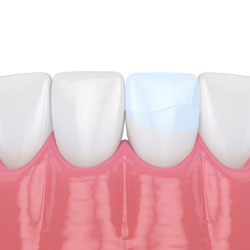 Bonding is a conservative way to repair slightly chipped, discolored, or crooked teeth. During dental bonding, a white filling is placed to improve your tooth's appearance. The filling bonds to your tooth and, because it comes in a variety of tooth-colored shades, it closely matches the appearance of your natural teeth.
Bonding is a conservative way to repair slightly chipped, discolored, or crooked teeth. During dental bonding, a white filling is placed to improve your tooth's appearance. The filling bonds to your tooth and, because it comes in a variety of tooth-colored shades, it closely matches the appearance of your natural teeth.
Bonding is less expensive than other cosmetic treatments and can usually be completed in one visit to our office. However, bonding can stain and is easier to break than other cosmetic treatments, such as porcelain veneers. If it does break or chip, let us know. The bonding can generally be easily patched or repaired in one visit.
Bridges
 A fixed bridge is used to replace missing teeth. Replacing missing teeth improves esthetics, helps maintain the shape of your face and evenly distributes biting forces. In our office, bridges are fabricated out of zirconia, a very strong tooth-colored material.
A fixed bridge is used to replace missing teeth. Replacing missing teeth improves esthetics, helps maintain the shape of your face and evenly distributes biting forces. In our office, bridges are fabricated out of zirconia, a very strong tooth-colored material.
The success of any bridge depends on its foundation — the other teeth to which it is attached. Therefore, it’s very important to keep up on your preventative care to keep your existing teeth and gums healthy and strong.
Crowns
 A crown is a procedure used to strengthen a tooth and restore it to an appropriate shape. Crowns are most often used for teeth that are broken, worn, or have portions destroyed by tooth decay. Crowns are also used to hold cracked teeth together.
A crown is a procedure used to strengthen a tooth and restore it to an appropriate shape. Crowns are most often used for teeth that are broken, worn, or have portions destroyed by tooth decay. Crowns are also used to hold cracked teeth together.
A crown is a porcelain cap cemented onto an existing tooth that covers all or some of the portion of your tooth above the gum line. In effect, the crown becomes your tooth’s new outer surface. Most crowns in our office are made of zirconia, a tooth-colored material. Thanks to recent advances, zirconia crowns can mimic the beauty and translucency of natural teeth and are very strong.
Crowns are needed when there is insufficient tooth structure remaining to hold a filling. Unlike fillings, where the restoration is built in your mouth, a crown is fabricated at a lab from an impression or a digital scan. The dental laboratory technician examines all aspects of your occlusion and customizes your crown to seamlessly fit into your bite.
Extractions
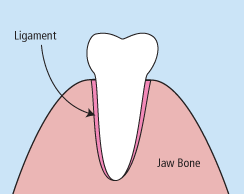 There are times when it is necessary to remove a tooth, for example if the tooth is too decayed to restore. We perform some routine extractions at our office. If the extraction appears complicated or if the patient is interested in a dental implant to replace the tooth, the patient is referred to a local oral surgeon for removal.
There are times when it is necessary to remove a tooth, for example if the tooth is too decayed to restore. We perform some routine extractions at our office. If the extraction appears complicated or if the patient is interested in a dental implant to replace the tooth, the patient is referred to a local oral surgeon for removal.
Once a tooth has been removed, neighboring teeth may shift, causing problems with chewing or with jaw joint function. To avoid these complications, we often recommend that the tooth be replaced with an implant or a bridge.
Fillings
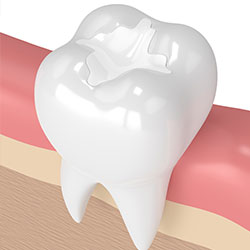 At our office, all fillings are placed with tooth-colored composite material. We do not place any silver fillings.
At our office, all fillings are placed with tooth-colored composite material. We do not place any silver fillings.
We are often asked by patients if they should replace all of their silver fillings. In our opinion, if it's not broke, don't fix it. As long as the old silver filling is not an esthetic concern and does not have any recurrent decay, open margins or cracks, we recommend leaving it in place.
Fluoride
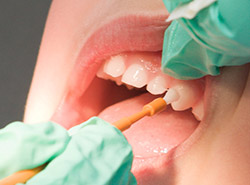 Fluoride is effective in preventing tooth decay and can help treat root sensitivity.
Fluoride is effective in preventing tooth decay and can help treat root sensitivity.
A fluoride treatment in our office takes just a minute or two. A clear-drying fluoride varnish is painted on your teeth. After the varnish is applied, patients are asked not to rinse, eat or drink for at least 30 minutes in order to allow the teeth to absorb the fluoride. Depending on your oral condition, we may recommend a fluoride treatment every 6 or 12 months.
Implant Restoration
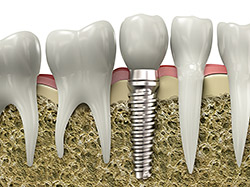 If you are missing teeth, it is crucial to replace them. Without all your teeth, chewing and eating can destabilize your bite and cause you discomfort. When teeth are missing, your mouth can shift and even cause your face to look older. Implants are a great way to replace your missing teeth, and if properly maintained, can last a lifetime!
If you are missing teeth, it is crucial to replace them. Without all your teeth, chewing and eating can destabilize your bite and cause you discomfort. When teeth are missing, your mouth can shift and even cause your face to look older. Implants are a great way to replace your missing teeth, and if properly maintained, can last a lifetime!
An implant is a prosthetic root made of titanium with a porcelain crown on top that looks like your natural tooth. With implant treatment, you can smile confidently knowing no one will ever suspect you have a replacement tooth.
Our office fabricates crowns for implants but does not place the titanium prosthetic root. Instead, we work closely with area surgeons to assure that implants are placed in appropriate locations to assure that our final crown is healthy and appears natural.
In addition to tooth replacement, implants may be used to anchor dentures, especially lower dentures that always shift when you talk or chew. For patients with removable partial dentures, implants can replace missing teeth so you have a more natural-looking smile.
Mouthguards
 Whether you wear braces or not, protecting your smile while playing sports is essential. Mouthguards help protect your teeth from injury. If you participate in any kind of full-contact sport, the American Dental Association recommends that you wear a mouthguard.
Whether you wear braces or not, protecting your smile while playing sports is essential. Mouthguards help protect your teeth from injury. If you participate in any kind of full-contact sport, the American Dental Association recommends that you wear a mouthguard.
Choosing the right mouthguard is essential. There are three basic types of mouthguards: the pre-made mouthguard, the “boil-and-bite” fitted mouthguard, and a custom-made mouthguard from your dentist. When you choose a mouthguard, be sure to pick one that is tear-resistant, comfortable and well-fitted for your mouth, easy to keep clean, and does not prevent you from breathing properly.
Nightguards
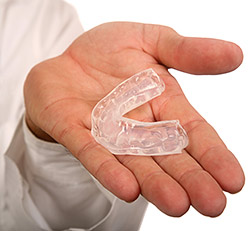 If you often wake up with jaw pain, earaches, or headaches, or if you find yourself clenching or grinding your teeth, you may have a common condition called bruxism. Many people do not even know that they grind their teeth, as it often occurs during sleeping. If not corrected, bruxism can lead to broken teeth, cracked teeth, or even tooth loss.
If you often wake up with jaw pain, earaches, or headaches, or if you find yourself clenching or grinding your teeth, you may have a common condition called bruxism. Many people do not even know that they grind their teeth, as it often occurs during sleeping. If not corrected, bruxism can lead to broken teeth, cracked teeth, or even tooth loss.
There is an easy, non-invasive treatment for bruxism: nightguards. Nightguards are an easy way to prevent the wear and damage that teeth-grinding causes over time. Our office can fabricate a custom nightguard made of sturdy acrylic to fit over your teeth. This nightguard will prevent contact with the opposing teeth and relax your facial muscles during wear.
Root Canals
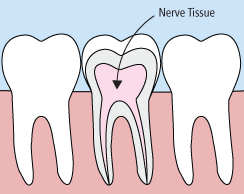 In the past, if you had a tooth with a diseased nerve, you'd probably lose that tooth. Today, with a special dental procedure called root canal therapy, your tooth can be saved. When a tooth is cracked or has a deep cavity, bacteria can enter the pulp tissue and germs can cause an infection inside the tooth. If left untreated, an abscess may form. If the infected tissue is not removed, pain and swelling can result. This can not only injure your jawbones, but it is also detrimental to your overall health.
In the past, if you had a tooth with a diseased nerve, you'd probably lose that tooth. Today, with a special dental procedure called root canal therapy, your tooth can be saved. When a tooth is cracked or has a deep cavity, bacteria can enter the pulp tissue and germs can cause an infection inside the tooth. If left untreated, an abscess may form. If the infected tissue is not removed, pain and swelling can result. This can not only injure your jawbones, but it is also detrimental to your overall health.
We do not perform root canal therapy at our office. All teeth that require root canals are referred to local root canal specialists, also known as endodontists.
After the tooth is treated by the endodontist, you will return to our office to have a restoration placed. For molars and bicuspids, a crown is almost always recommended. For front teeth, we often recommend just restoring the tooth with a composite tooth-colored filling if the existing restorations are not too large.
Veneers
 You no longer need to hide your smile because of gaps, chips, stains, or misshapen teeth. With veneers, you can easily correct your teeth’s imperfections to help you have a more confident, beautiful smile. Veneers are natural in appearance, and they are a perfect option for patients wanting to make minor adjustments to the look and feel of their smile.
You no longer need to hide your smile because of gaps, chips, stains, or misshapen teeth. With veneers, you can easily correct your teeth’s imperfections to help you have a more confident, beautiful smile. Veneers are natural in appearance, and they are a perfect option for patients wanting to make minor adjustments to the look and feel of their smile.
Veneers are thin, custom-made shells made from porcelain that are designed to cover the front of your teeth. Before placing veneers, we will need to conservatively prepare your tooth to make room for the porcelain. We then take a very detailed impression and send it to our lab to have the veneers fabricated.
When your veneers are placed, you’ll be pleased to see how natural they look!
Wisdom Teeth
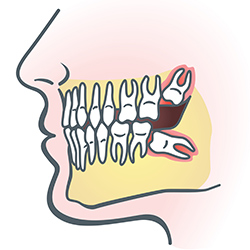 Wisdom teeth are types of molars found in the very back of your mouth. They usually appear in the late teens or early twenties, but may become impacted (fail to erupt) due to lack of room in the jaw or angle of entry. When a wisdom tooth is impacted, it may need to be removed. If it is not removed, you may develop gum tenderness, swelling, or even severe pain. Impacted wisdom teeth that are partially or fully erupted tend to be quite difficult to clean and are susceptible to tooth decay, recurring infections, and even gum disease.
Wisdom teeth are types of molars found in the very back of your mouth. They usually appear in the late teens or early twenties, but may become impacted (fail to erupt) due to lack of room in the jaw or angle of entry. When a wisdom tooth is impacted, it may need to be removed. If it is not removed, you may develop gum tenderness, swelling, or even severe pain. Impacted wisdom teeth that are partially or fully erupted tend to be quite difficult to clean and are susceptible to tooth decay, recurring infections, and even gum disease.
Wisdom teeth are typically removed in the late teens or early twenties because there is a greater chance that the teeth's roots have not fully formed and the bone surrounding the teeth is less dense. These two factors can make extraction easier as well as shorten the recovery time.
Our office refers most wisdom tooth extractions to local oral surgery offices.
